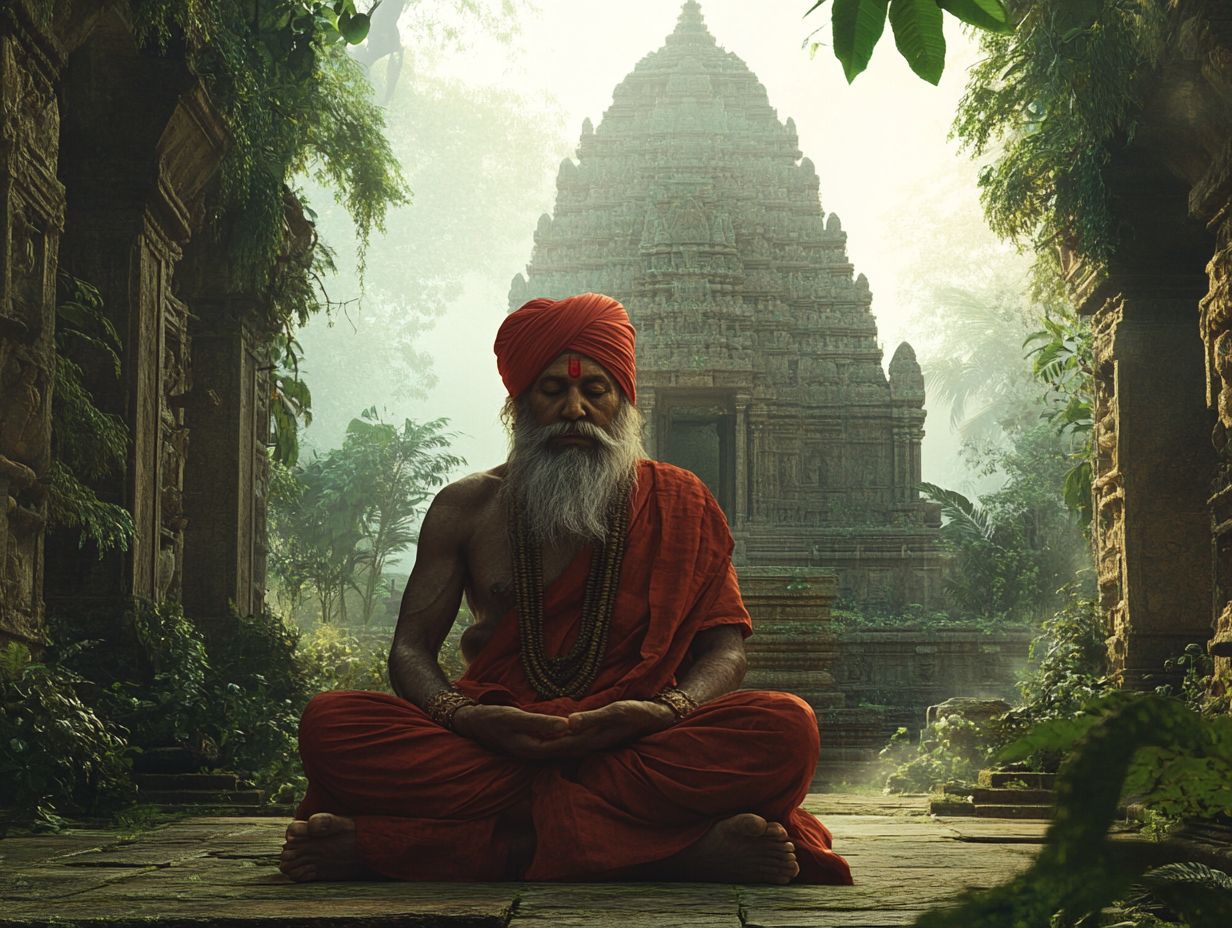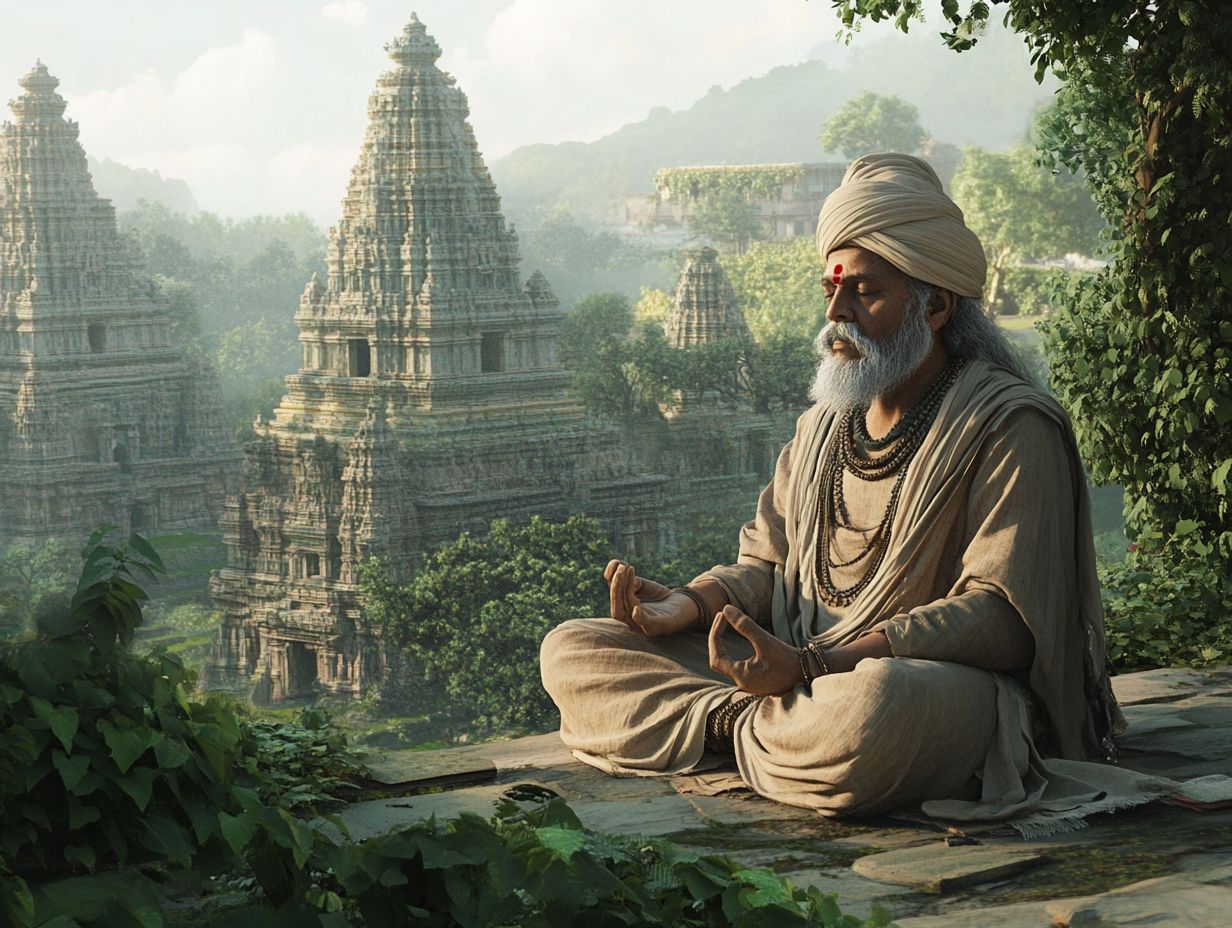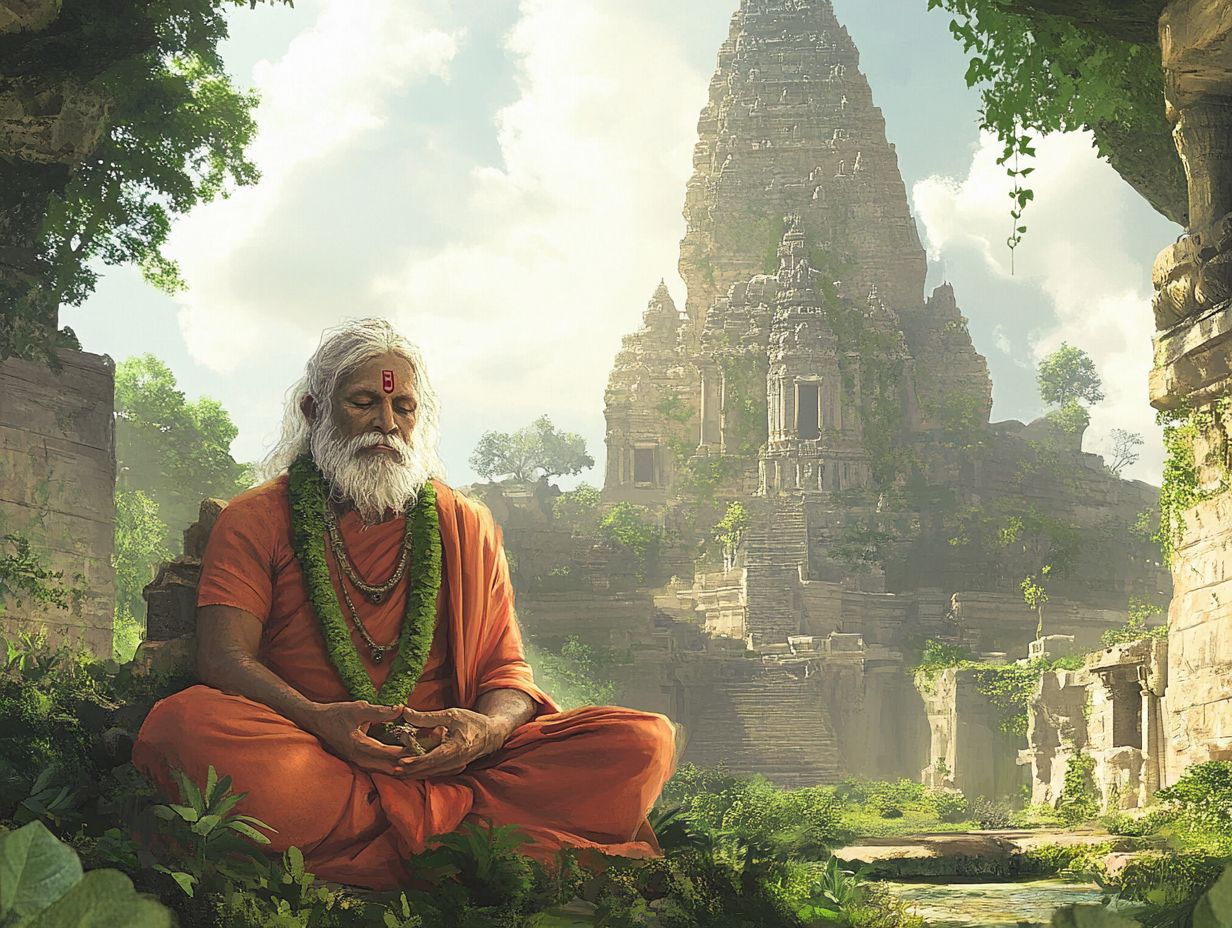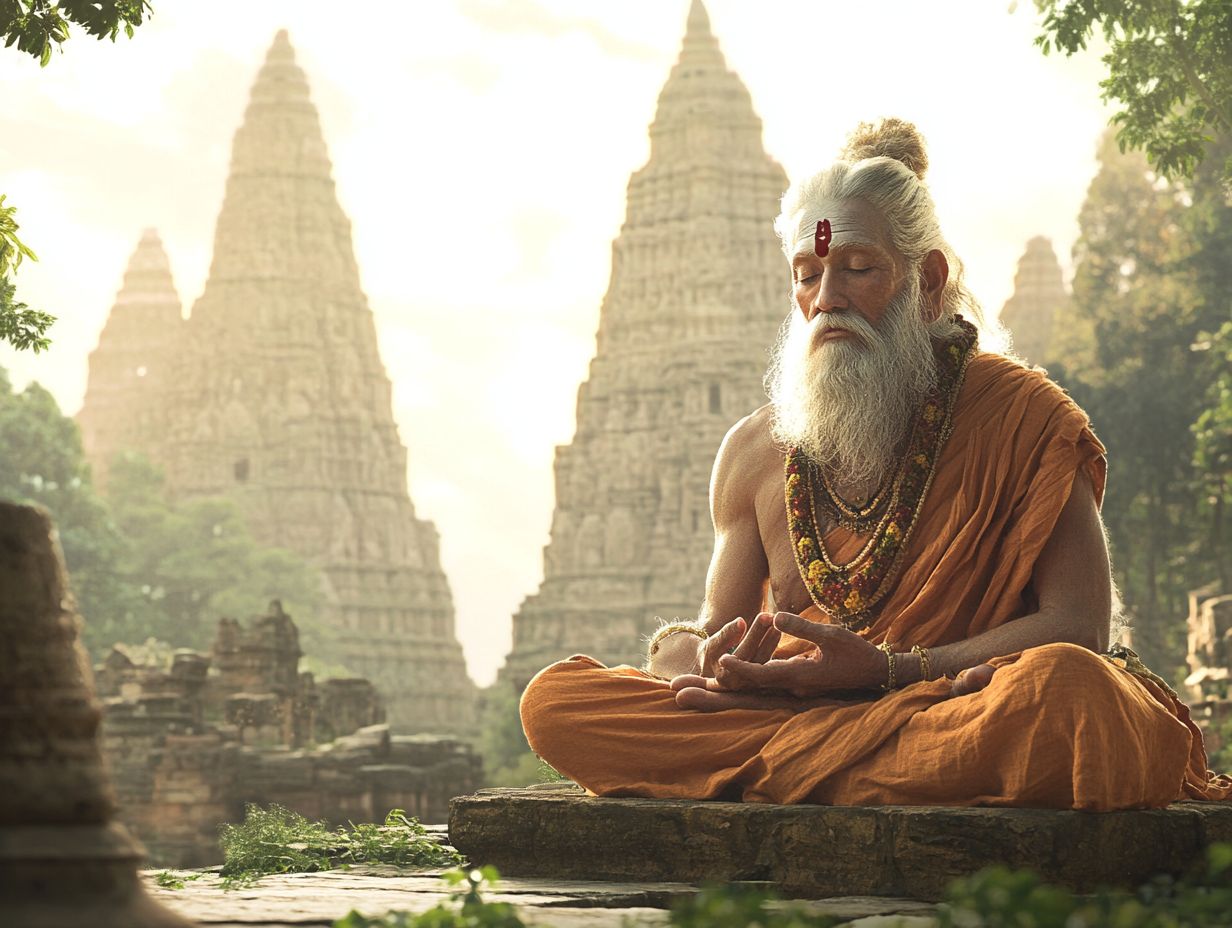Who Was the Founder of Hinduism?
Hinduism, recognized as one of the world’s oldest religions, presents a rich tapestry of beliefs, practices, and a complex historical evolution. Distinctively, it does not have a singular founder; rather, it has emerged from a confluence of ancient traditions, spiritual practices, and philosophical thought that has developed over millennia and has roots in the Indus Valley civilization.
This article delves into the origins of Hinduism, illuminating its key figures, including revered gods, goddesses, and prophets, alongside its fundamental beliefs, rituals, and sacred texts such as the Upanishads and the Vedic texts. It also examines Hinduism s profound influence on cultures and religions across the globe, as well as its contemporary manifestations and spiritual practices.
Readers are invited to embark on this enlightening journey through the intricate heart of Hinduism, exploring its diverse sects, teachings on dharma and karma, and the pursuit of moksha.
Origins of Hinduism

The origins of Hinduism, acknowledged as one of the world s oldest living religions, can be traced back to ancient times, intricately woven into the rich cultural heritage of the Indian subcontinent, particularly the Indus Valley civilization and the Aryans who contributed significantly to its formation.
This venerable faith, referred to as Sanatana Dharma, encompasses a vast array of philosophies, beliefs, and rituals, including yoga and meditation, that have undergone significant evolution over millennia.
Essential elements such as the Vedic texts, the Upanishads, and the teachings of revered Hindu sages have established the foundational framework for numerous aspects of practice and spirituality, profoundly influencing the development of Hinduism from its inception to contemporary times.
What Were the Earliest Forms of Hinduism?
The earliest forms of Hinduism emerged from ancient practices that are intricately reflected in the Vedic texts, which serve as the cornerstone of this complex belief system. These sacred scriptures, composed between 1500 and 500 BCE, not only delineate the philosophical tenets of Hinduism but also introduce rituals that guide both worship and societal structure, including the early forms of the caste system.
Through ceremonial offerings and chants, practitioners aimed to establish a harmonious connection with the deities represented within these texts. As centuries advanced, the influence of the Vedic traditions became increasingly evident in the myriad of rituals and festivals celebrated today, showcasing a dynamic evolution of belief and practice.
The deities venerated by followers, such as Agni, the fire god, and Indra, the king of gods, derive their significance from the rich narratives embedded in these ancient hymns, illustrating how these time-honored practices continue to resonate deeply within the spiritual lives of millions. Other prominent deities such as Vishnu, Shiva, and Brahma also play crucial roles in Hindu worship and mythology.
How Did Hinduism Evolve Over Time?
Hinduism has experienced a remarkable evolution over the centuries, adeptly adapting to cultural shifts and seamlessly integrating various sects and traditions into its expansive tapestry of beliefs. This evolutionary journey exemplifies the religion’s inherent flexibility and resilience, enabling it to thrive in a multitude of socio-political contexts.
The emergence of distinct sects, such as Vaishnavism and Shaivism, serves as a testament to how diverse philosophies and deities have captivated the devotion of followers, thereby enriching the broader spiritual landscape. Additionally, the incorporation of regional customs and practices, evident in local festivals and rituals, underscores the dynamic essence of Hindu traditions.
Over time, these adaptations have not only played a crucial role in preserving ancient texts like the Mahabharata and Ramayana but have also ensured the continued relevance of Hinduism in the modern world, fostering a profound connection between its rich historical legacy and contemporary life.
Who Was the Founder of Hinduism?
In contrast to many world religions, Hinduism does not trace its origins to a single founder. Rather, it emerges as a rich tapestry of cultural and spiritual practices, philosophical schools such as Vedanta and Yoga, and ancient traditions that have evolved over millennia.
The notion of Sanatana Dharma, meaning ‘eternal law,’ embodies the diverse beliefs and traditions that reflect the profound philosophies found in ancient texts, the legacies of historical figures, and the cultural influences from the Indian subcontinent.
This lack of a singular founder has enabled Hinduism to thrive in myriad forms, fostering its remarkable resilience and adaptability throughout history.
Is There a Single Founder of Hinduism?
The question of whether there is a singular founder of Hinduism invites deep contemplation, as Sanatana Dharma reflects an intricate amalgamation of teachings from various historical figures, prophets, and sages rather than being anchored in a solitary origin.
This distinctive feature fosters a rich tapestry of beliefs that have evolved over millennia, illustrating the synthesis of diverse philosophies and practices. The contributions of esteemed sages, such as Vyasa, credited with compiling the Vedas, and Adi Shankaracharya, who was instrumental in the promotion of Advaita Vedanta, highlight the significance of multiple perspectives in the development of Hindu thought.
Moreover, regional variations further enrich this spiritual tradition, as different communities weave their local customs and interpretations into the fabric of core principles. The absence of a centralized figure accentuates a collective journey toward enlightenment, rendering Hinduism a vibrant and inclusive faith that continues to resonate profoundly with millions around the globe.
What are the Different Perspectives on the Founder of Hinduism?

Different perspectives on the founder of Hinduism emerge from historical interpretations, each contributing to a nuanced understanding of the religion’s evolution and diversity and its deep roots in ancient civilizations.
Scholars have posited that Hinduism lacks a singular founder, instead evolving from a rich tapestry of ideas, practices, and cultural exchanges spanning millennia. Some interpretations highlight the influential roles of ancient sages, known as rishis, in shaping its spiritual framework, while others emphasize the significance of various influences, including the Indus Valley civilization and subsequent Vedic thought, in its development.
This complexity reveals a synthesis of philosophies and rituals, portraying Hinduism as an ever-changing mosaic rather than a monolithic structure defined by a single individual. Consequently, engaging with these scholarly debates enhances the appreciation of Hinduism s pluralistic nature and its ongoing journey through history.
Major Figures in Hinduism
The major figures in Hinduism represent a diverse tapestry of deities, gurus, and historical sages, such as Vyasa and Adi Shankaracharya, all of whom play crucial roles in shaping its beliefs and practices.
From the revered gods Vishnu, Shiva, and Brahma to the esteemed rishis and sages, these individuals and deities encapsulate the philosophical and spiritual teachings that lie at the heart of Hindu thought. Goddesses like Saraswati, Lakshmi, and Parvati also hold significant roles in the spiritual and religious lives of worshippers.
Their narratives are intricately woven into sacred scriptures such as the Upanishads, the Bhagavad Gita, the Ramayana, and the Mahabharata, offering followers profound insights into ethical living, devotion, and the quest for moksha.
Who are the Major Gods and Goddesses in Hinduism?
The major gods and goddesses in Hinduism, notably the Trimurti comprising Brahma, Vishnu, and Shiva, hold pivotal roles in the religion’s cosmology and spiritual practices. Each deity embodies unique qualities that reflect various aspects of existence, guiding devotees through the diverse stages and challenges of life. Goddesses like Lakshmi and Saraswati complement these divine manifestations, representing wealth and knowledge, respectively.
Brahma, as the creator, symbolizes intellectual and spiritual pursuits, while Vishnu, the preserver, epitomizes the maintenance and balance within the universe. In contrast, Shiva, the destroyer, represents transformation and the cyclical nature of existence.
Worship practices frequently involve intricate rituals, prayers, chants, and offerings, allowing believers to forge a profound connection with the divine. Temples and sacred sites play a crucial role in these practices, serving as focal points for communal and individual worship.
Celebrations such as Diwali and Navaratri highlight the vibrant tapestry of Hindu traditions, honoring these deities and fostering a sense of community through collective celebration and devotion.
Who are the Key Prophets and Teachers in Hinduism?
Key prophets and teachers in Hinduism, including a variety of revered gurus and spiritual leaders, have played a pivotal role in imparting teachings that guide followers toward spiritual enlightenment and ethical living. These influential figures, among them esteemed sages and iconic philosophers, have been fundamental in shaping the philosophical landscape of the religion.
Through their teachings on essential concepts such as dharma, karma, and moksha, they inspire adherents to pursue lives marked by righteousness and harmony. The spiritual practices established by these leaders such as meditation, yoga, and rituals cultivate a profound connection with the divine while fostering community cohesion.
Their impact resonates widely, motivating countless individuals to seek deeper truths, nurture virtues, and contribute positively to society. This reflects the enduring legacy of such revered personalities within the rich tapestry of Hindu thought and the broader religious identity of Hindu society.
Beliefs and Practices in Hinduism
The beliefs and practices within Hinduism are remarkably diverse and multifaceted, anchored in foundational principles such as Dharma, karma, and the ultimate pursuit of moksha. These elements collectively illustrate the profound philosophical depth and spiritual richness inherent in the religion, as reflected in its sacred scriptures like the Vedic texts, Upanishads, and the Bhagavad Gita.
Rituals and ceremonies, including puja and meditation, serve as vital expressions of devotion, fostering a meaningful connection to the divine. Through these spiritual practices, practitioners are equipped to navigate the complexities of life while remaining steadfast in their adherence to Hindu beliefs and traditions.
What are the Core Beliefs of Hinduism?

The core beliefs of Hinduism are anchored in the principles of Dharma, karma, and moksha, which collectively form the bedrock of its spiritual teachings and ethical framework. These fundamental concepts not only guide followers on their spiritual journeys but also shape their interactions with the world around them, reflecting the rich philosophical schools and ethics rooted in ancient traditions.
Dharma embodies righteousness and moral duties, encouraging individuals to align their lives with both societal and cosmic laws. This commitment to duty not only influences personal conduct but also enhances the well-being of the community at large.
Karma, the principle asserting that every action bears consequences, instills a profound sense of responsibility, prompting practitioners to act with mindfulness. Moksha, symbolizing the ultimate spiritual goal of liberation from the cycle of birth and rebirth, compels believers to pursue enlightenment and inner peace. These beliefs are often explored in sacred texts such as the Upanishads and the Bhagavad Gita.
Together, these beliefs interweave to create a rich tapestry that informs both everyday choices and long-term aspirations within Hindu life.
What are the Key Rituals and Practices in Hinduism?
Key rituals and practices in Hinduism encompass a diverse array of activities, including puja, meditation, and a variety of festivals that celebrate the religion’s rich cultural and spiritual heritage. These practices serve not only as expressions of devotion but also as profound avenues for connecting with the divine, often guided by a guru or spiritual leader.
Through rituals such as the intricate arati ceremony and chanting mantras, practitioners foster a sense of community and shared purpose, while personal endeavors like meditation nurture individual spiritual growth. The variations in how these rituals are performed often reflect regional traditions and personal beliefs, highlighting the inherent diversity within Hinduism, including different sects and worship of various deities like Vishnu, Shiva, and Saraswati.
Festivals such as Diwali and Holi encapsulate communal joy and the spirit of renewal, reinforcing essential values like love, generosity, and harmony. Each ritual, imbued with its unique significance, contributes meaningfully to the spiritual lives of those who engage in them, often incorporating elements from Hindu mythology and the sacred Puranas.
Influence and Spread of Hinduism
The influence and reach of Hinduism extend far beyond geographical confines, leaving a profound imprint on diverse cultures and religions across the globe. This remarkable tradition often assimilates local beliefs and practices, demonstrating a unique capacity for integration and harmony, particularly through its adaptability and blending with other cultural influences.
Such cultural diversity illustrates Hinduism’s resilience and adaptability, particularly in an increasingly interconnected world.
How Has Hinduism Influenced Other Religions and Cultures?
Hinduism has profoundly shaped other religions and cultures, often emerging as a wellspring of philosophical and spiritual insight while showcasing a remarkable ability to adapt to local traditions. Its origins trace back to ancient civilizations like the Indus Valley and the influence of the Aryans.
The foundational principles of karma and dharma have found their way into a variety of belief systems, promoting an emphasis on moral conduct and duty that resonates deeply across cultures. In regions such as Southeast Asia, the incorporation of Hindu deities into local customs illustrates a significant exchange of ideas and rituals, resulting in vibrant syncretic traditions. This blend of practices highlights Hinduism’s role as a flexible and pluralistic religion.
This remarkable capacity to merge with indigenous practices not only underscores Hinduism’s flexibility but also its enduring relevance, cultivating a sense of unity among diverse groups. The global recognition of yoga and meditation, rooted in Hindu philosophy, has transformed lifestyles and spiritual practices far beyond their origins, illustrating the religion’s profound impact on global spirituality and wellness.
Such exchanges exemplify how Hinduism not only coexists with other beliefs but also enriches the spiritual tapestry of the world.
Where is Hinduism Practiced Today?
Today, Hinduism thrives among millions worldwide, with vibrant communities that celebrate a myriad of festivals and partake in diverse rituals within temples and homes, reflecting the ancient roots and evolving practices of this dynamic religion.
In major cities such as New York, London, and Sydney, practitioners come together to honor age-old traditions, illustrating the religion s remarkable adaptability and relevance in the modern era. Temples function not only as sacred spaces for worship but also as bustling community hubs where cultural exchange flourishes, fostering connections among devotees from varied backgrounds and preserving the rich cultural heritage of Hinduism.
Significant festivals like Diwali and Holi unite individuals, allowing them to partake in the colorful and rich heritage that shapes their spiritual identities. Furthermore, various social initiatives championed by these communities underscore a steadfast commitment to values such as service and compassion, showcasing the dynamic and evolving essence of Hindu practices in today s world, rooted in ancient Vedic texts and sacred manuscripts.
Frequently Asked Questions

Who Was the Founder of Hinduism?
The founder of Hinduism is not a single person, as it is believed to have originated from ancient Indian traditions and beliefs, influenced by the spiritual and philosophical insights of the Vedic texts and other religious scriptures.
Was Hinduism founded by a specific person?
No, Hinduism is a fusion of various beliefs and practices that evolved over centuries. It does not have a specific founder, but it has been deeply influenced by historical figures, Vedic texts, and the rich tapestry of Indian culture.
Did Hinduism have a specific starting point?
Hinduism is one of the oldest religions in the world, with no specific starting point. It evolved gradually over time, emerging from the ancient civilization of the Indus Valley and influenced by the Aryans, with contributions from various philosophical schools and mysticism.
Are there any historical figures associated with the founding of Hinduism?
There are many historical figures and ancient scriptures that have contributed to the development of Hinduism, but it does not have a single founder. The religion’s rich history and cultural evolution are reflected in its diverse beliefs systems and sacred texts like the Ramayana and the Mahabharata.
What is the role of the Vedas in the founding of Hinduism?
The Vedas, a collection of ancient religious texts, played a significant role in shaping the beliefs and practices of Hinduism, but they are not considered the sole foundation of the religion. Other important texts include the Upanishads, the Bhagavad Gita, and the Puranas, which collectively contribute to the spiritual and philosophical landscape of Hinduism.
Is there a specific date or event that marks the founding of Hinduism?
No, Hinduism does not have a specific date or event that marks its founding. It is a constantly evolving religion that has been shaped by various influences over time, including the ancient Vedic traditions and subsequent religious texts, highlighting its enduring spiritual evolution.
